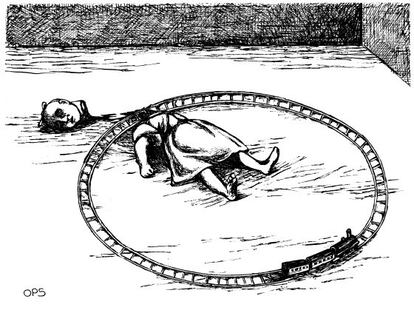Symbolizing Spain's misery
Cartoonist Andrés Rábago was OPS before becoming El Roto

If you open a newspaper and see a cartoon of a man walking in a crowd, asking himself: "If we are going backwards, why do they tell us you have to look forward?" you know for sure it is by El Roto, the better-known pseudonym of Andrés Rábago.
Every morning, for more than a quarter of a century, the EL PAÍS cartoonist has been dissecting reality and showing us its falsehoods and lies. But what perhaps many people don't know is that before El Roto, which deals with the external and social world in direct language, there was OPS. During the final stage of Francoism and the first year of the Transition, Rábago's previous alter ego knocked on the door of Spain's subconscious to dig around in the silence of its miseries and fears. In the pages of Hermano Lobo, Triunfo, Cuardernos para el diálogo and other publications of the time, he found a niche to dig up the dirt on the dictatorship and reveal the bugs and monsters that Spaniards carried inside, which paralyzed them without realizing.
The Royal Academy of Fine Arts is paying tribute to this ancestor of El Roto with a carefully assembled exhibition within its National Print Archive, which also holds Goya's The Disasters of War and Los Disparates series. The venue is no coincidence. According to Juan Bordes, director of the archive and organizer of the show, OPS and Goya have a lot in common, as much the formal characteristics of Rábago's graphic system, as his conceptual work, which is "bound to the same strategies and operations as Goya - which can be seen in the Caprichos enfáticos and which ended with The Disasters of War - when he has to use coded metaphors in a period of repression and speak in intelligent language, via symbols that went over the heads of the totalitarian regime of Ferdinand VII, or Franco, in the case of OPS."
OPS lived between the second half of the 1960s and the start of the 1980s, when Rábago felt the character was exhausted and no longer useful for connecting with a society that was changing so quickly. The show includes 60 original drawings from OPS' mature phase, without including his apprentice works or those of his final years, when he existed side-by-side with El Roto.
OPS, says Rábago, operated in the "less rational areas of the mind's structure; the most emotional part, of instincts, the realm of desires and fears, everything that we carry inside and is often obscured and emerges in moments of panic, or anger." It was without doubt a reflection of the gray Spain of late Francoism and also of an age "in which the windows couldn't remain closed any longer." After it "died" when society changed, "a second form of communication emerged, as if OPS was working in the subsoil and suddenly [...] emerged and was looking around to see what there was; and what there was is El Roto."
OPS: Dibujos para Cuardernos para el diálogo, Triunfo, Madriz Hermano Lobo. Until June 10 at Real Academia de Bellas Artes, C/ Alcalá 13, Madrid. http://rabasf.insde.es/
Tu suscripción se está usando en otro dispositivo
¿Quieres añadir otro usuario a tu suscripción?
Si continúas leyendo en este dispositivo, no se podrá leer en el otro.
FlechaTu suscripción se está usando en otro dispositivo y solo puedes acceder a EL PAÍS desde un dispositivo a la vez.
Si quieres compartir tu cuenta, cambia tu suscripción a la modalidad Premium, así podrás añadir otro usuario. Cada uno accederá con su propia cuenta de email, lo que os permitirá personalizar vuestra experiencia en EL PAÍS.
¿Tienes una suscripción de empresa? Accede aquí para contratar más cuentas.
En el caso de no saber quién está usando tu cuenta, te recomendamos cambiar tu contraseña aquí.
Si decides continuar compartiendo tu cuenta, este mensaje se mostrará en tu dispositivo y en el de la otra persona que está usando tu cuenta de forma indefinida, afectando a tu experiencia de lectura. Puedes consultar aquí los términos y condiciones de la suscripción digital.








































